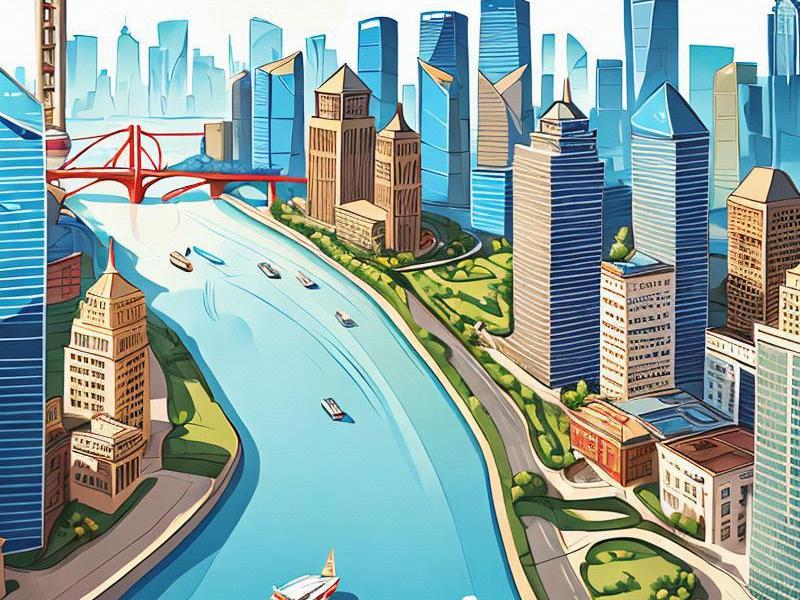
Nestled at the mouth of the Yangtze River, Shanghai enjoys a unique geographical advantage, serving as a natural gateway to the vast inland regions of China. Over the past few decades, Shanghai has transformed from a small fishing village into a world-renowned economic hub, attracting millions of people from all over the globe.
The city's rapid urban development is evident in its skyline, which is dotted with iconic skyscrapers such as the Oriental Pearl Tower, the Shanghai Tower, and the Jin Mao Tower. These architectural marvels not only symbolize Shanghai's economic prowess but also serve as a testament to the city's innovative spirit and commitment to modernization.
Shanghai's economy is characterized by its diverse industries, ranging from finance and trade to technology and manufacturing. The city is home to the Shanghai Stock Exchange, one of the largest stock exchanges in the world, and the Pudong Financial District, which houses numerous multinational corporations and financial institutions. This robust economic foundation has made Shanghai a key player in global trade and investment.
In addition to its economic achievements, Shanghai is also renowned for its rich cultural heritage. The city is a melting pot of different cultures, reflecting the influences of Chinese, Western, and international traditions. This cultural diversity is evident in the city's architecture, cuisine, art, and festivals.
One of the most famous cultural landmarks in Shanghai is the Bund, a historic waterfront area that showcases a blend of colonial-era buildings and modern skyscrapers. The Bund offers stunning views of the Huangpu River and the city skyline, making it a popular spot for tourists and locals alike.
新上海龙凤419会所 Another cultural gem in Shanghai is the Yu Garden, a classical Chinese garden that dates back to the Ming Dynasty. The garden features intricate pavilions, rockeries, and ponds, providing a serene escape from the bustling city life. Visitors can also explore the nearby Yuyuan Bazaar, a lively marketplace filled with traditional Chinese handicrafts, snacks, and souvenirs.
Shanghai's culinary scene is another highlight of the city, offering a wide range of flavors and dishes that cater to diverse tastes. From the famous Xiaolongbao (soup dumplings) to the savory Shengjianbao (pan-fried buns), Shanghai's cuisine is a delightful blend of sweet, savory, and spicy flavors. The city is also known for its vibrant night markets, where visitors can savor street food and experience the lively atmosphere of Shanghai's nightlife.
In recent years, Shanghai has been actively promoting sustainable urban development and environmental protection. The city has implemented various initiatives to reduce pollution, improve public transportation, and enhance green spaces. For example, the Maglev train, a high-speed magnetic levitation train, connects Shanghai's Pudong International Airport to the city center, offering a fast and eco-friendly mode of transportation.
Shanghai also boasts an extensive network of public transportation, including buses, subways, and ferries, making it convenient for residents and visitors to navigate the city. The city's metro system, one of the busiest in the world, covers a vast area and provides easy access to major attractions, business districts, and residential areas.
上海水磨外卖工作室 Education and innovation are also key pillars of Shanghai's development. The city is home to several prestigious universities and research institutions, attracting top talent from around the world. Shanghai's commitment to innovation is reflected in its numerous technology parks and incubators, which foster the growth of startups and high-tech enterprises.
One of the most notable examples of Shanghai's innovation is the Zhangjiang Hi-Tech Park, a state-level high-tech zone that focuses on biotechnology, information technology, and new materials. The park has attracted numerous leading companies and research institutions, contributing to Shanghai's reputation as a global innovation hub.
Shanghai's role in global affairs is also significant. The city has hosted numerous international events, such as the World Expo in 2010 and the G20 Summit in 2016, showcasing its ability to organize and host large-scale events. These events have not only enhanced Shanghai's international profile but also strengthened its ties with other cities and countries around the world.
Despite its rapid development, Shanghai remains committed to preserving its historical and cultural heritage. The city has implemented various measures to protect its historic buildings and neighborhoods, ensuring that future generations can appreciate the rich history and culture of Shanghai.
上海贵族宝贝sh1314 One such initiative is the conservation of the French Concession, a historic area in the city that was once home to foreign concessions. Today, the French Concession is a popular tourist destination, featuring charming cobblestone streets, vintage architecture, and boutique shops.
Shanghai's commitment to sustainability is also evident in its efforts to promote green buildings and energy-efficient technologies. The city has set ambitious targets for reducing carbon emissions and increasing the use of renewable energy sources. For example, the Shanghai Tower, the tallest building in China, incorporates advanced energy-saving technologies and features a unique twisting design that reduces wind resistance.
In conclusion, Shanghai is a dynamic and vibrant city that embodies the spirit of modernization and globalization. Its rapid economic growth, rich cultural heritage, and commitment to sustainable development make it a model city for urbanization and innovation. As Shanghai continues to evolve and grow, it will undoubtedly remain a key player on the global stage, shaping the future of China and the world.
